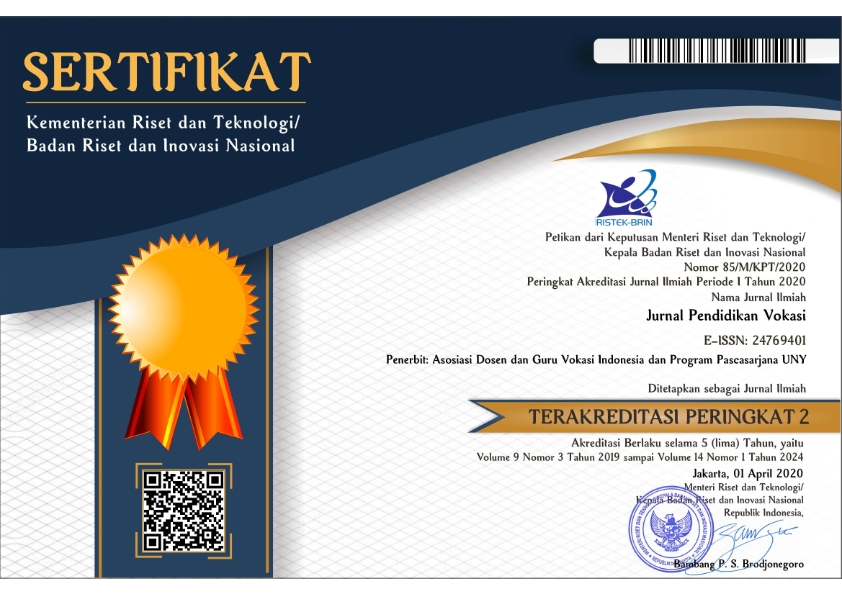Faktor-faktor yang berpengaruh terhadap prestasi belajar teori kejuruan siswa SMK
DOI:
https://doi.org/10.21831/jpv.v3i2.1603Keywords:
Kinerja mengajar guru, pemanfaatan fasilitas belajar, motivasi berprestasi, teachers' teaching performance, utilization of learning facilities, achievement motivationAbstract
Penelitian ini bertujuan untuk mengetahui pengaruh kinerja mengajar guru, pemanfaatan fasilitas belajar dan motivasi berprestasi baik secara parsial maupun simultan terhadap prestasi belajar teori kejuruan siswa SMK Kompetensi Keahlian Teknik Instalasi Tenaga Listrik di Kota Yogyakarta. Populasi dalam penelitian ini adalah siswa kelas XII kompetensi keahlian teknik instalasi tenaga listrik di SMK se-Kota Yogyakarta. Sampel sejumlah 170 siswa ditentukan menggunakan proportional random sampling technique dengan rumus Slovin. Intrumen yang digunakan adalah angket tertutup dan tes tentang teori kejuruan. Analisis data menggunakan teknik regresi linier sederhana dan regresi linier ganda dengan taraf signifikansi 5%. Hasil penelitian adalah sebagai berikut. (1) Terdapat pengaruh yang signifikan antara kinerja mengajar guru terhadap prestasi belajar teori kejuruan dengan besarnya pengaruh adalah 32,8 %. (2) Terdapat pengaruh yang signifikan antara pemanfaatan fasilitas belajar terhadap prestasi belajar teori kejuruan dengan besarnya pengaruh adalah 9 %. (3) Terdapat pengaruh yang signifikan antara motivasi berprestasi siswa terhadap prestasi belajar teori kejuruan dengan besarnya pengaruh adalah 14,1 %. (4) Terdapat pengaruh yang signifikan antara kinerja mengajar guru, pemanfaatan fasilitas belajar dan motivasi berprestasi siswa secara bersama-sama terhadap prestasi belajar teori kejuruan dengan besarnya pengaruh secara simultan adalah 34,3 %, sedangkan 63,7 % dipengaruhi oleh faktor yang lain.
THE FACTORS THAT EFFECT FOR STUDENTS ACHIEVEMENT OF VOCATIONAL THEORY IN VOCATIONAL HIGH SCHOOL (SMK)
Abstract
The purpose of this study was to examine the effect of teachers' teaching performance, utilization of the learning facilities, and achievement motivation either individually or simultaneously on the achievement of vocational theory of electrical power engineering of the students of vocational high schools in Yogyakarta City. The population in this study was students of class XII in electrical power engineering skill competency at vocational high schools in Yogyakarta City. A sample of 170 students was established using the proportional random sampling technique with Slovin formula. The instruments used were a closed questionnaire and test of the vocational theory. The data analysis used simple linear regression and multiple linear regression analyses with the significance level of 5%. The results are as follows. (1) There is a significant effect of teachers' teaching performance on their achievement in vocational theory with the magnitude of effect of 32.8 %. (2) There is a significant effect of the utilization of learning facilities on the students' achievement in vocational theory with the magnitude of effect of 9 %. (3) There is a significant effect of students' achievement motivation on their achievement in vocational theory, with the magnitude of effect of 14.1 %. (4) There is a significant effect of teachers' teaching performance, their utilization of learning facilities, and their achievement motivation on their achievement in vocational theory with the simultaneous magnitude of effect of 34.3 %, while 63.7 % is affected by other factors.
References
Alderman, M.K. (2004). Motivation for achievement: Possibilities for teaching and learning (2nd ed.). New Jersey: Lawrence Erlbaum Associates.
Anastasi, A., & Urbina, S. (1997). Psyhological testing. (7th ed.). New Jersey: Prentice-Hall, Inc.
Aydın, F., & CoÅŸkun, M. (2011). Secondary School Students' "Achievement moti- vation" towards Geography Lessons. Journal of scholars research library. Karabí¼k: Karabí¼k University. Diambil pada tanggal 30 November 2012 dari http://scholarsresearchlibrary.com/archive.html.
Azhar Arsyad. (2007). Media pembelajaran. Jakarta: PT. RajaGrafindo Persada.
Dedi Supriadi. (1999). Mengangkat citra dan martabat guru. Yogyakarta: Adicita Karya Nusa.
Depdiknas. (2008). Panduan analisis butir soal. Direktorat Jenderal Manajemen Pendidikan Dasar dan Menengah.
Depdiknas. (2008). Permendiknas No. 40 Tahun 2008, tentang standar sarana dan prasarana di SMK/MAK.
Depdiknas. (2003). Undang-undang, Nomor 20, tahun 2003, tentang Sistem Pendidikan Nasional.
Finch, C.R., & Crunkilton, J.R. (1999). Curriculum development in vocational and technical education: Planning, content, and implementation (5th ed.). Boston: Allyn and Bacon.
Gibson, J.L. et al. (2009). Organizations: Behavior, structure, processes (14th ed.). New York: McGraw-Hill.
Griffin, R.W. (2004). Manajemen (edisi ke-tujuh). (Terjemahan Gina Gania). Boston: Houghton Miffin. (Buku asli diterbitkan tahun 2002)
Husein Umar. (1999). Metode penelitian untuk skripsi dan tesis bisnis. Jakarta: PT. Raja Grafindo Persada.
Jones, J., & Jenkin, M., & Lord, S. (2006). Developing effective teacher performance. New Delhi: Paul Chapman Publishing.
Kemendiknas. (2012). Pedoman penyelenggaraan UN kompetensi keahlian SMK tahun pelajaran 2011/2012.
Murphy, P.K. (2009). Cultural competence initiative.The Arlington Public Schools. Diambil pada tanggal 13 September 2012 dari http://www.doe.virginia.gov/special_ed/tech_asst_prof_dev/self_assessment/disproportionality/arlington_adapted_cultural_competence_notebook.pdf
Nana Sudjana. (2005). Dasar-dasar proses belajar mengajar. Bandung: Sinar Baru Algensindo.
Popham, W.J. (1995). Classroom assessment: What teachers need to know (6th ed.). Boston: Allyn and Bacon.
Soeprijanto. (2010). Pengukuran kinerja guru praktik kejuruan, konsep dan teknik pengembangan instrumen. Jakarta: CV. Tursina.
Sofyan Yamin., & Rachmach, L.A., & Heri Kurniawan. (2011). Regresi dan korelasi dalam genggaman anda: Aplikasi dengan software SPSS, Eviews, MINI-TAB, dan STATGRAPHICS. Jakarta: Penerbit Salemba Empat.
Sugiyono. (2011). Metode penelitian administrasi dilengkapi dengan metode R&D. Bandung: Alfabeta.
Suharsimi Arikunto. (2012). Dasar-dasar evaluasi pendidikan. Jakarta: Bumi Aksara.
Suharsimi Arikunto. (2002). Prosedur penelitian: Suatu pendekatan praktek, Jakarta: Rineka Cipta.
Uzer Usman. (2002). Menjadi guru profesional. Bandung: PT Remaja Rosdakarya
Wardiman Djojonegoro (1998). Pengembangan sumber daya manusia: Melalui Sekolah Menengah Kejuruan (SMK) Jakata: Jayakarta Agung Ofset.
Downloads
Published
How to Cite
Issue
Section
License
The authors submitting a manuscript to this journal agree that, if accepted for publication, copyright publishing of the submission shall be assigned to Jurnal Pendidikan Vokasi. However, even though the journal asks for a copyright transfer, the authors retain (or are granted back) significant scholarly rights.
The copyright transfer agreement form can be downloaded here: [JPV Copyright Transfer Agreement Form]
The copyright form should be signed originally and sent to the Editorial Office through email to jpvokasi@uny.ac.id
Jurnal Pendidikan Vokasi by http://journal.uny.ac.id/index.php/jpv is licensed under a Creative Commons Attribution-ShareAlike 4.0 International License.














